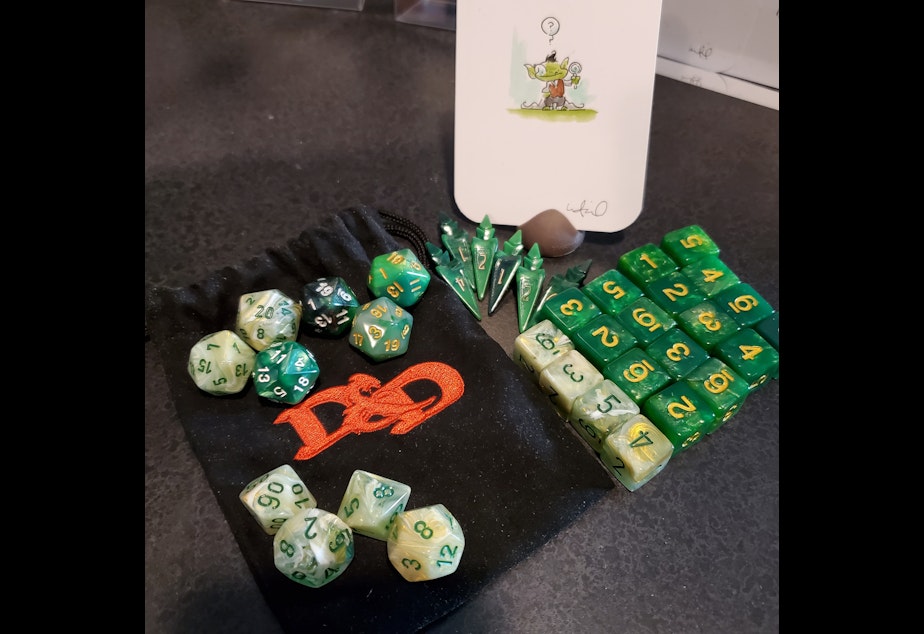Dungeons & Dragons fans clash with publisher over creative control

Western Washington is known for gaming — it’s the birthplace of the XBOX, for instance, and Nintendo of America has its headquarters here.
It’s also the home of Wizards of the Coast, publisher of the massively popular game “Dungeons & Dragons.”
Wizards of the Coast and D&D fans are in the middle of a massive row, after a draft of the company's new license for the game was leaked. The leaked proposal would limit the degree to which third-party publishers could contribute to and profit from the game.
If you know anyone who plays the game, you’ve probably heard them ranting about it over the past two weeks. And if you don’t understand exactly what happened, it's because like the game, the situation is kind of complicated.
D&D has been a cultural phenomenon since it first hit tabletops back in 1974. During this nearly 50-year span of fighters and wizards delving into dungeons to battle fearsome dragons, the game has been built with the imaginations of the people playing it.
D&D has gone through many changes over the years. Players today are generally using the 5th Edition of the rules, and Wizards of the Coast is currently in the process of building the next version of the game.
D&D was originally published by TSR, Inc., which was purchased by Wizards of the Coast in 1997; Wizards was bought by Hasbro in 1999.
Sponsored
Then in 2000, Wizards of the Coast decided to open the castle gates to let anyone write adventures for the game. They came up with a legal document that provided third-party publishers — or just D&D enthusiasts — the rules and tools to write adventures and supplemental material for the “world’s most popular role-playing game.”
This document is called the Open Gaming License, or O. G. L.
Linda Codega is a reporter with io9, and has been covering this story from the beginning.
“The Open Gaming License was a default use license issued in 2000," Codega explained. "It allowed third-party content creators to take parts of the Dungeons & Dragons intellectual property, make their own products, and then sell it for profit. Basically like a copyright license, except that anyone could use it at any time, and nobody needed to ask permission to use it.”
In 2000, the OGL was revolutionary.
Sponsored
"There's really not another giant IP out there that allows people to use and profit from their IP in a way like Dungeons & Dragons does," Codega said. "Certainly not at the the kind of scale that Dungeons & Dragons currently exists at.”
D&D content creators have been writing and publishing adventures under the OGL for years, mostly using 5th Edition rules. But now that Wizards of the Coast has been working on the next version of the game, the next version of the gaming license was rumored to follow.
In late 2022, Codega caught wind that Wizards of the Coast had approached a number of third party publishers with NDA forms and what they called a "draft version" of OGL 1.1.
“Jan. 5, I got a leaked document," Codega said. "That leaked document was the proposed draft of the OGL 1.1.”
OGL 1.1 was a vast change from OGL 1.0a. It included things like a royalty structure, and the ability for Wizards to license back your content.
Sponsored
Fans were not happy, and took immediate action.
“Yeah, I think the responses ... are passionate," Codega said. "It's one of those things where people are essentially being told by a giant corporation, what they can do with their imaginations. So of course, everyone's up in arms about it.”
Fans rallied around the idea that they needed to speak with their wallets, rather than just their Twitter accounts.
"There was a mass unsubscription from Dungeons & Dragons Beyond," Codega explained. "Wizards of the Coast paid attention because the impact was so swift. If those subscriptions do not come back, it will have a marked impact on their bottom line at the end of the year.”
Subscriptions to the D&D Beyond website bring in millions of dollars of revenue every year. We don’t have an exact number of how many people unsubscribed, but it was enough that Wizards of the Coast responded immediately. Wizards posted an “apology” of sorts.
Sponsored
Online discourse about the issue became ugly. A very small, but very loud part of the fandom flew into a rage, and started attacking anyone who appeared to be defending D&D.
One of the community managers at Wizards of the Coast started receiving death threats, and had to get the FBI involved.
Eventually, things took a turn for the better. Wizards posted a thoughtful response penned by D&D Executive Producer Kyle Brink. He explained that Wizards of the Coast was going to listen to the community as they get to work on this new open gaming license, OGL 1.2.
The new license, if revised as planned, would be a big concession to fans and third-party publishers. It puts the basic rules of the game into the Creative Commons License and includes the terminology “perpetual” and “irrevocable.”
Even so, Codega said the company has been dealt some big damage.
Sponsored
"It is showing that they are making an attempt to engage back with the community in good faith, even though that trust and the goodwill is almost completely gone within the fandom."
Meanwhile, fans have until Feb. 3 to read over the proposed changes to OGL 1.2 and provide their feedback, after which the team at Wizards of the Coast will sort through it all. An update after their feedback process is scheduled for Feb. 17.
You can listen to the entire conversation by clicking on the audio above.





